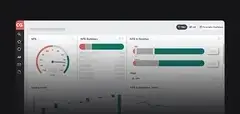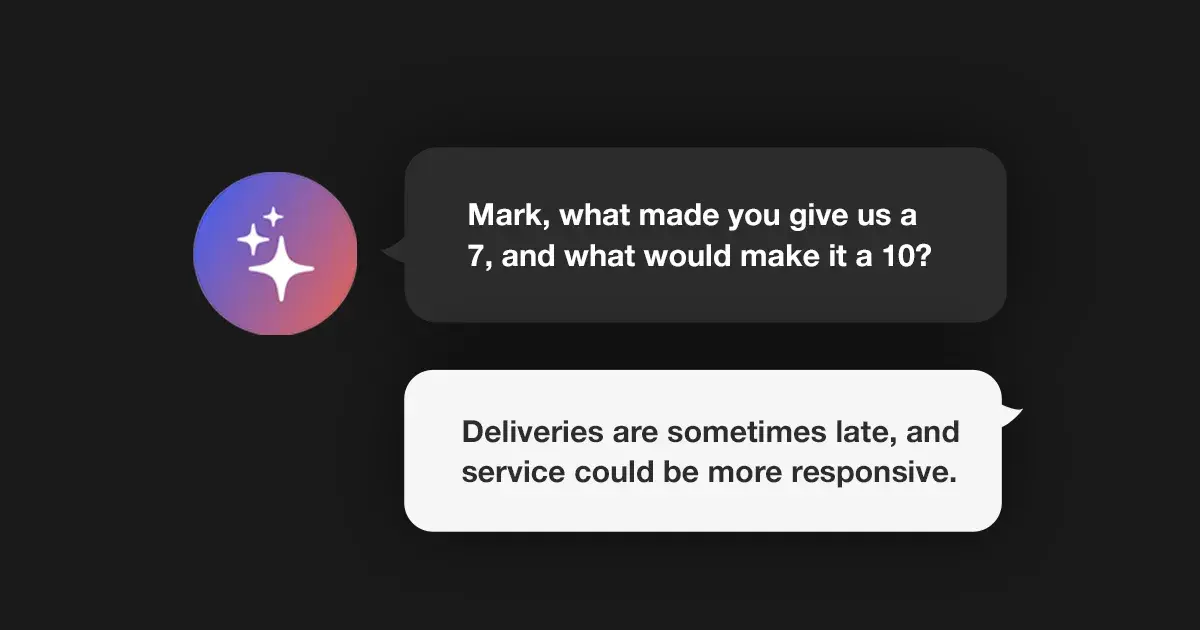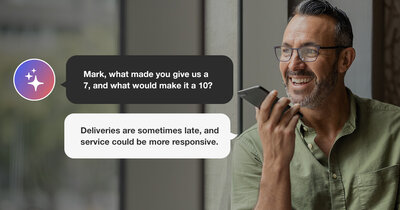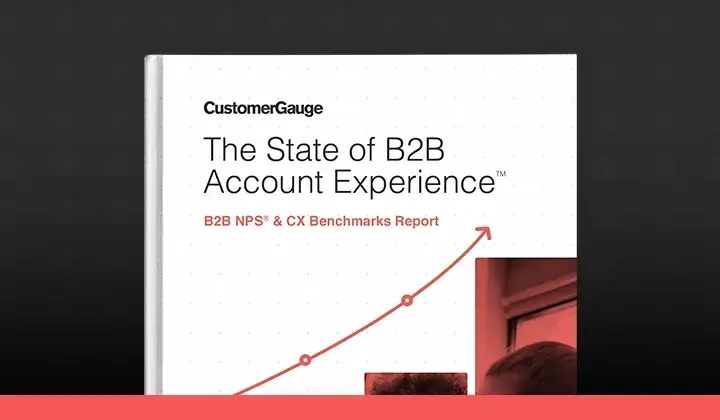Collecting customer feedback and experience data is vital to understand how customers feel about your product or service. To get a real sense of their expectations, frustrations, and positive sentiments, customer surveys are key.
These days, there are many customer experience (CX) survey software options out there — some recognized for the simplicity of their surveying process, while others boast substantial analytics tools, too.
The one that’s best for you will depend on the size of your business, the complexity of your customer journey, and what you want to do with the data you collect.
That’s important because excellent customer experience management (CXM) entails more than just conducting surveys and collecting data. To build CX that helps you retain customers and drive growth, it’s crucial to take action on what your surveys tell you.
Here, we’ll show you how to choose a customer experience survey software that truly helps you do that, so you can satisfy your customers, fight churn, and grow your revenue.
Why Invest in Customer Experience Survey Software?
The best customer experience software will bring a number of concrete benefits.
It will save you time by automating repetitive CX processes, make it easy for your team to close the loop quickly and effectively, and pave the way for new revenue gains.
Let's explore why survey software is crucial for improving your CX performance.
1. Access Authentic Insights Into Your CX Performance
CX survey software gives insights into how your efforts are performing, including:
What your customers are really thinking. For example, a free-text comment box with text analysis features is helpful here to uncover sentiments.
The sentiments of multiple stakeholders in a given customer account. Between the C-Suite and product users, perspectives vary, and want to access them all.
The degree of customer loyalty. You can gauge this through specific CX surveys such as Net Promoter Score (NPS).
Your survey software collects these insights from customer feedback.
Ideally, alongside structured sources of feedback like relationship and transactional NPS surveys, CX software will give you access to unstructured feedback like live chat logs, too.
2. Automate the CX Essentials
Your CX team should be free to focus on analyzing accounts and improving your customers’ experiences. That means it’s really helpful to automate the mundane, repetitive tasks they may now spend the majority of their time doing.
CX survey software does exactly that, by automating:
Feedback collection. The right software automates your survey campaigns by using predetermined triggers, such as particular transactions, to send customer surveys.
Closing the loop. This is the process of taking action based on customer feedback and letting customers know about the steps you’ve taken. Surveys such as NPS reveal which of your customers are most unhappy and, therefore, most likely to churn. A closed loop process lets your team intervene in response to that feedback to reduce customer churn.
However, it’s important to act quickly — that’s where automation comes in.
Some CX survey software automates parts of the closed-loop feedback process, sending your team members alerts and notifications, for example, to ensure no respondent gets forgotten.
- Analytics and reporting. The right survey software will facilitate omnichannel data collection, so your CX team has access to customer sentiments across all channels. This gives all parts of your business a holistic overview of your CX.
3. Tie CX to Revenue
According to CustomerGauge research, only 30% of companies link their CX data to financial data.
And 62% aren’t calculating the ROI of their CX efforts.
By not tying CX to revenue, you’re not getting the most out of your experience program. You’ll likely struggle to win internal buy-in for your efforts, and you’ll be blind to the financial impact that your work is having, meaning you may find it difficult to leverage CX for growth.
As such, the right CX survey software should help you bridge this gap by linking CX to financial data.
This means you’ll need software that includes real-time reporting and analytics that deliver insights into:
The highest churn risks. Which customer accounts are most likely to churn (for example, those with low NPS scores, or low response/engagement rates) and how much revenue is at risk of churn.
The cost of specific CX drivers. For example, if your highest-value accounts tell you your customer support isn’t up to scratch, that driver is a serious threat to your revenue.
How to Choose the Right CX Survey Software
When choosing the right customer experience survey software, it’s important to first assess your needs and find a tool that best caters to them. For example, software that works well for a B2C company often falls short for B2B businesses, and vice versa.
Here are 6 considerations to keep in mind to ensure you get the right survey software for you:
Does it scale well? As your business grows, your customer base will expand and you’ll need to scale your CX efforts. Is the software equipped to scale accordingly? For example, does the software allow omnichannel data collection or have the necessary integrations (e.g., to pull data from your customer relationship management (CRM))? And does it make it easy to manage large survey cohorts?
Is it designed for B2B or B2C? B2B customer journeys are more complex than their B2C counterparts. For example, B2B journeys include multiple touchpoints, longer buying cycles, and multiple decision-makers in each account. To respond well to these needs, a B2C survey software won’t cut it.
Is it easy to use? Your CX team will be running survey campaigns, analyzing accounts, and implementing the best closed-loop practices. That’s why it’s crucial to choose a tool with an intuitive user interface (UI). For example, some CX software lets team members access all functions by default, while others create custom profiles for each user.
Does it integrate with your existing tech stack? Can your survey software pull data from your CRM software, live chat, or chatbot tools? It’s important to choose a CX software provider that has the integrations you need.
Is it secure and has a robust infrastructure? Your CX survey software will host sensitive customer data, so it’s important to choose a platform that has the right level of security. Look into how the CX provider protects your data and if they adhere to privacy standards (e.g. GDPR compliance).
Does the vendor “walk the walk”? CX software vendors are selling customer experience solutions, so check how they manage their own CX. Do they provide the right level of support? How committed are they to customer success?
5 Top Rated Customer Experience Survey Software
We’ve put together a list of 5 top-rated CX survey software to help you choose one that’s right for your business.
It’s not a ranked list, we’ve just shared trusted software that could be useful for you:
1. CustomerGauge
Price: Starts around $1000 annually per user.
Best for: Mid-market and Enterprise B2B and B2B2C companies that need to reduce churn and grow account sizes.
Top 3 industries: Manufacturing, consumer packaged goods, technology.
Customer service: Rated 9.6 for Quality of Support on G2.
G2 score: 4.6
CustomerGauge was created to bridge some gaps that existing CX survey software left wide open, specifically in the B2B space.
B2B businesses have more complex needs and need a specific platform tailored to meet them. That platform is CustomerGauge, according to Gartner, who ranked us #1 for B2B & B2B2C.
CustomerGauge developed the Account Experience (AX) Framework, a proprietary methodology based around NPS to help B2B companies get the most out of their customer experience programs. For example, CustomerGauge’s platform ties your customer feedback to each account’s revenue, so your team knows which accounts are churn risks, which CX efforts to prioritize, and when to initiate closed-loop processes.
Why We’re Different
While most CX survey software focuses on data collection (i.e., running surveys to collect feedback), CustomerGauge provides a suite of CX management tools to help you turn these insights into action.
The platform helps sales, CSMs, and account managers grow the revenue of existing accounts and drive growth by gathering insights from customer experience data.
2. Medallia
Price: Contact Medallia for a quote.
Best for: Larger B2C organizations looking to improve their CX management strategy.
Top 3 industries: Retail, financial services, and technology and telecommunications.
Customer service: Rated 8.5 for Quality of Support on G2.
G2 score: 4.5
Medallia is a leading CX software that gives CX managers detailed cross-channel insights into customer sentiments and behaviors. Medallia makes surveying simple with automation tools and an easy to use platform.
The software was designed with every day, large-scale use in mind. However, Medallia’s self-service capabilities are limited and additional support is expensive.
Why They’re Different
Medallia is easy to set up and navigate, while built for scale. So, as your CX program grows, Medallia is right there with you.
3. Qualtrics
Price: Qualtrics CustomerXM’s plans start at $1500/year
Best for: Businesses of all sizes, with fewer than 10 customers to over 50,000.
Top 3 industries: Financial services and retail.
Customer service: Rated 8.7 for Quality of Support on G2.
G2 score: 4.3
As a CX software vendor, Qualtrics is one of the best-known platforms with a comprehensive set of tools. The company’s dedicated CX software, Customer XM, comes with sophisticated survey automation, an intuitive interface, and top security.
Qualtrics Customer XM makes it easy to collect data, analyze it, and take action based on CX insights.
However, customer reviews do point out that it can be quite tricky to navigate at first. And, according to Gartner, it comes in third for the B2B use case, after CustomerGauge and Medallia.
Why They’re Different
Qualtrics has an extensive global client base and a suite of tools to help businesses optimize different experiences, including CX, employee experience, brand experience, etc.
4. SurveyMonkey
Price: SurveyMonkey has a limited free plan (the Basic plan) that lets you send unlimited surveys with up to 10 questions each. Its paid plans are divided into: Team Plans (starting at $25/user/month), Individual Plans (starting at $35/month), and Enterprise (contact SurveyMonkey for a custom quote).
Best for: SurveyMonkey was originally best suited for only small-to-medium-sized businesses. However, the company has recently expanded to the enterprise sector by improving the platform’s administration, integrations, and security capabilities.
Top 3 industries: Healthcare, Non-profit, Education.
Customer service: Rated 8.6 for Quality of Support on G2.
G2 score: 4.4
If you’ve ever looked into conducting surveys, you’ve likely heard of SurveyMonkey—it’s the best-known CX survey software, used by more than 335,000 companies and over 20 million unique users.
The tool is exceptionally easy to use and novice users can get started quickly with more than 200 ready-made templates.
Why They’re Different
The company’s free plan makes it a popular choice for small businesses and its Enterprise plans are prepared for more advanced CX needs with CRM integrations (like Salesforce), an intuitive user management dashboard, and auditing features.
5. Zonka Feedback
Price: Professional plan costs $79/month; plans go up to the Enterprise tier costing $429/month. Zonka Feedback also offers custom plans, and they have an entry-level tier from $24 for personal use. The company also offers a 15-day trial.
Best for: Small-to-medium-sized businesses looking to start surveying their customers.
Top 3 industries: Unknown
Customer service: Rated 9.5 for Quality of Support rating on G2
G2 score: 4.7
Zonka Feedback is a reliable CX survey software that’s very easy to set up. It takes just a few minutes to start your survey campaign and you can customize surveys and feedback pages.
As an omnichannel platform, the tool lets you collect and combine data from different channels, giving a holistic view of your customer base. It also supports many integrations, including with popular CRMs and helpdesk software.
Why They’re Different
Zonka Feedback is simple, so businesses can start running survey campaigns quickly. They also have the second highest Quality of Support rating of the tools on our list according to Gartner (after CustomerGauge).
Choosing Customer Experience Survey Software: The Bottom Line
As you might have gathered from our list, CX survey software share the same core features, but they differ in crucial ways.
Some are best suited to B2C brands, while others, such as CustomerGauge, are designed with B2B in mind. And while some are better for smaller businesses, others are designed to be used at scale.
The point is to choose the tool that’s best suited to your needs. Consider the maturity of your CX platform, your business model, and what features you need to best serve your customers.
If you’re a B2B brand looking to leverage customer experience data to fight churn and grow revenue, CustomerGauge is the CX survey software you need.
Get in touch with us to get started!




